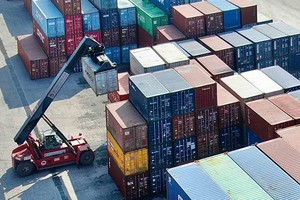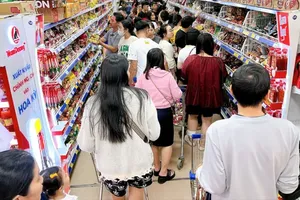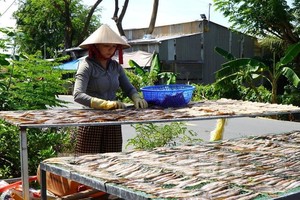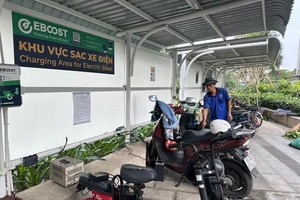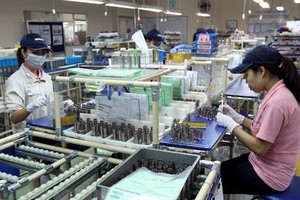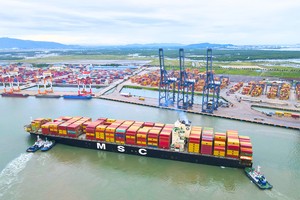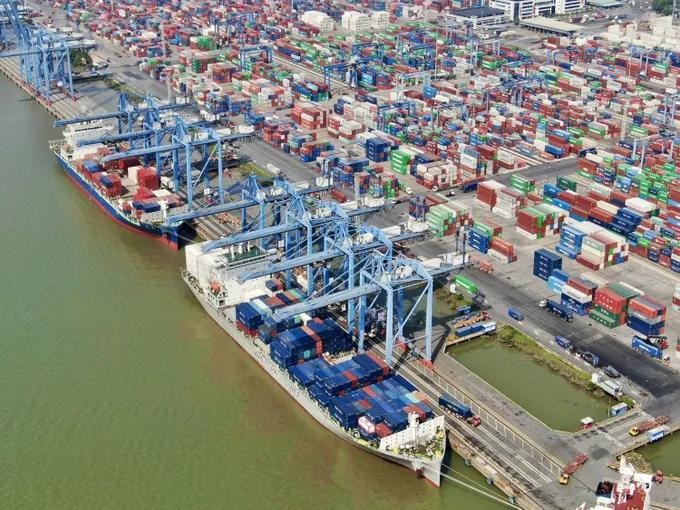
In 2024, HCMC achieved an export turnover of US$46 billion with the US market representing approximately 16 percent of the total. Looking ahead to 2025, HCMC anticipates an improvement in exports. However, the ongoing 'trade war' stemming from the US's reciprocal tax policy poses challenges, prompting local enterprises to focus on sustaining production while also seeking solutions and strategies to thrive and foster growth.
Enterprises anxiously await tax negotiations
Chairman Vu Thai Son of the Board of Directors of Long Son Group said that the company is rushing to prepare the last 20 containers of cashew nuts in time for delivery to the US partner before July 9. Failure to secure favorable tax terms by July 9 is projected to eliminate new US orders, potentially requiring enterprises to suspend production for 1-2 months for restructuring.
In a similar vein, Chairman Do Ha Nam of Intimex Group disclosed that US importers have refrained from making new orders as they await the outcome of tax negotiations. According to him, if the circumstances not improve, Intimex may temporarily halt production for the US market.
Worse, the textile and garment sector is likely to experience significant pressure due to the implementation of reciprocal taxes from the US.
According to Deputy General Secretary of the Vietnam Textile and Apparel Association (VITAS) Nguyen Thi Tuyet Mai, current orders were signed before the new tax policy was announced and businesses are rushing off their feet to fulfil the orders.
However, new orders have yet to be signed, as partners remain concerned about tax-related risks and the traceability of raw material origins. The seafood industry, in particular, is approaching the situation with heightened caution.
Director Nguyen Van Minh of Nghi Son Seafood Import-Export Company complained that the company's US partners have halted new orders pending the outcome of ongoing tax negotiations. In the meantime, the firm are maintaining production at a moderate level to preserve the workforce and operational infrastructure.
Businesses are proactively shifting markets
Amid the threat of order cancellations, numerous businesses in Ho Chi Minh City have had no choice but found alternative markets.
Mr. Do Ha Nam said that Intimex is shifting to Europe, the Middle East, and countries that have signed free trade agreements (FTAs) with Vietnam. He said certainly, accessing new markets is not easy, due to technical standards, logistics costs and fierce competition.
Representatives of many enterprises believed that there should soon be specific and flexible support mechanisms from local and central governments to develop the market and curb losses due to broken orders.
Businesse voiced their opinions that negotiations should be stepped up to bring the reciprocal tax rate from the US to a reasonable threshold. Moreover, it is necessary to implement fiscal policies to support affected export enterprises such as corporate income tax exemption, VAT payment extension, access to low-interest credit. In addition, many businesspersons suggested that it is necessary to soon establish a regular dialogue channel between state agencies and the export sector to update policies, communications on problems, typically regulations of origin, ESG standards (environment, society, governance) or QR code tracing.
Another significant challenge is the rise in international logistics and transportation costs, which has severely impacted business profitability. At the same time, the domestic logistics infrastructure—particularly in the Southern region—remains fragmented and poorly connected.
Chairman of the Ho Chi Minh City Business Association Nguyen Ngoc Hoa proposed development of a large-scale, inter-regional logistics hub that links with major seaports and both waterway and railway transport networks. In parallel, a coordinated mechanism should be established to facilitate data sharing on transportation and customs procedures among ministries, agencies, and local authorities, thereby reducing the circulation time of goods.
Can Van Luc, member of the Prime Minister's Policy Advisory Council, emphasized that Ho Chi Minh City, accounting for 21.9 percent of the nation's total export turnover and 17.5 percent of registered foreign direct investment, requires a dedicated policy framework to support businesses impacted by US tax regulations. Without timely and effective support, the decline in export orders could significantly undermine not only the city's economic growth but also that of the entire country. Support measures must be substantive, focusing on prioritized credit access for innovative enterprises, investment in traceability systems, greening of production chains, and structured export strategies aligned with international standards.
At the same time, the national trade promotion system must be strengthened in terms of both human resources and operating network in strategic markets such as the US, EU and the Middle East. Having a permanent trade representative will help enterprises access information early, understand technical requirements and reduce delays in policy response. In addition, public-private partnership in developing logistics and digital trade infrastructure must be accelerated to reduce operating costs, which is currently a major bottleneck.










